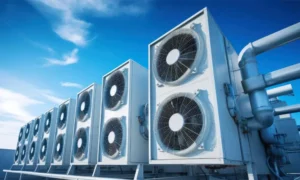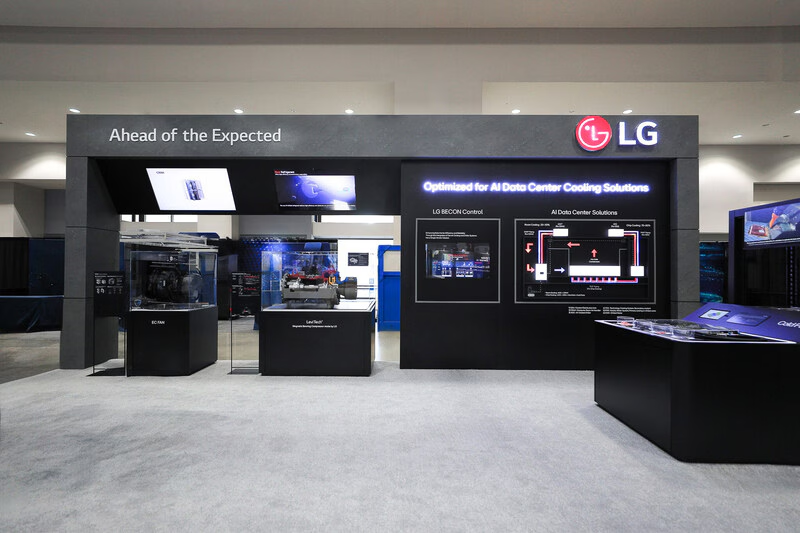In the current data-centric landscape, LG’s End-To-End Cooling Solutions have emerged as a vital innovation to meet the increasing requirements of high-capacity data centers.
As digital transformation accelerates across various sectors, the strain on infrastructure, particularly regarding thermal management, has intensified significantly.
Fortunately, LG has introduced a thorough, dependable, and energy-efficient system designed to tackle these challenges from the foundation up.
The Escalating Challenge of Data Center Cooling
As data consumption surges at an unprecedented rate, global data center capacity is anticipated to expand by nearly 20% each year until 2030. As a result, the necessity for effective cooling strategies becomes paramount.
These facilities not only handle vast amounts of data but also produce substantial heat. If this heat is not properly managed, it can jeopardize system performance and potentially result in expensive downtime.
To address these issues, LG launched its state-of-the-art thermal management system at Data Center World 2025. The timing is exceptionally opportune.
The rapid expansion of digital infrastructure demands more than traditional cooling technologies can provide, and LG is poised to deliver its advanced solutions to meet these needs.
Holistic Thermal Management: From Chip to Server Room
A significant distinguishing factor of LG’s End-To-End Cooling Solutions is its comprehensive approach. Instead of addressing heat challenges in a fragmented manner, LG manages the entire thermal management process, beginning with individual chips and extending to complete server rooms.
This cohesive solution includes:
Advanced Cold Plate Technology: Specifically engineered for high-performance chips, this innovation facilitates efficient heat transfer directly from the chip surface.
Compact Coolant Distribution Unit (CDU): The CDU is crucial for delivering coolant precisely where it is required while minimizing space usage.
Predictive Failure Diagnostics: Utilizing intelligent sensors and analytics, the system can foresee potential failures before they happen, thereby averting unexpected outages.
Energy-Efficient Computer Room Air Handlers (CRAHs): These units enhance airflow and cooling efficiency, leading to a significant reduction in energy consumption.
Collectively, these elements function harmoniously to sustain optimal operating temperatures, improve system reliability, and guarantee uninterrupted performance in mission-critical settings.
The Imperative of Energy Efficiency
Beyond performance, energy efficiency remains a paramount concern. Data centers rank among the highest energy consumers across various industries.
Nevertheless, LG’s system effectively lowers power consumption without sacrificing cooling performance. Consequently, facilities benefit from reduced operational costs and a smaller environmental impact.
This transition towards sustainable practices is not merely advantageous; it is crucial. With global efforts aimed at achieving carbon neutrality, organizations are increasingly encouraged (and in some cases mandated) to implement greener technologies.
LG’s cooling system rises to meet this challenge directly.
LG’s Comprehensive Cooling Solutions Shaping Industry Developments
Emerging trends in the cooling sector include:
Establishing Standards in Intelligent Cooling
It is important to recognize that LG’s advancements are not occurring in isolation. They are in line with several key trends within the industry:
Comprehensive Thermal Management: There is a growing emphasis on integrated systems capable of regulating temperature throughout an entire infrastructure.
Intelligent Predictive Diagnostics: With the rise of AI-driven systems, predictive maintenance is becoming a standard expectation.
Sustainability-Focused Engineering: Environmental responsibility is now essential. Companies are actively seeking collaborations with partners that provide energy-efficient and low-emission solutions.
In light of these changes, cooling technologies must advance to be not only more effective but also more intelligent. LG’s offerings directly respond to this demand.
Influence on the Data Center Landscape
The introduction of this technology carries significant implications. It has the potential to transform the entire data center environment by motivating other manufacturers to pursue similar innovations.
Additionally, it underscores the increasing convergence between traditional HVAC systems and the requirements of digital infrastructure. This synergy is driving a wave of innovation that propels both fields forward.
Moreover, it is relevant to the evolving landscape of semiconductor manufacturing. As chips grow in power and compactness, their thermal requirements also increase. Fortunately, advanced cooling solutions are essential to support the next generation of computing hardware.
Applications Beyond Data Centers
Although LG’s End-To-End Cooling Solutions are primarily tailored for data centers, the technologies involved can also be advantageous for various other industries.
Sectors such as advanced manufacturing, artificial intelligence research, and healthcare are increasingly adopting data-intensive systems that necessitate effective cooling solutions.
By leveraging LG’s innovations for these alternative applications, organizations can achieve enhanced operational uptime, reduced energy expenses, and overall improved performance.
Looking Ahead: A Cooler, Smarter Future
The need for intelligent, scalable, and sustainable cooling solutions is expected to grow significantly in the coming years.

Whether it involves supporting artificial intelligence, powering smart cities, or managing cloud storage for millions of users, effective thermal management remains a critical necessity.
With LG’s End-To-End Cooling Solutions, businesses receive more than mere temperature regulation; they gain assurance. Each component is meticulously designed to promote reliability and energy efficiency, fostering long-term growth in the digital landscape.
Furthermore, as these systems evolve to become more intelligent, we can anticipate improved integration with building management systems, IoT sensors, and data analytics platforms.
This advancement will enable companies to monitor and optimize cooling performance in real-time, enhancing resource allocation and operational flexibility.
Expert Editorial Comment
Undoubtedly, LG is setting a new standard for cooling in data centers. By merging innovative design with robust technology, they have developed a solution that not only addresses current needs but also prepares for future challenges.
In a fast-paced environment where every second and every degree is crucial, such foresight is invaluable.

